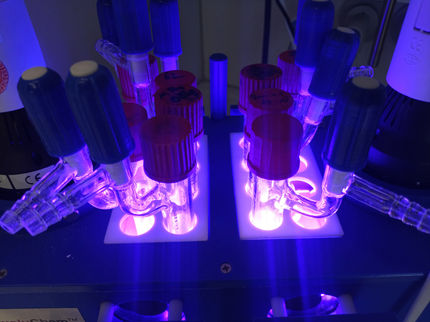Ph.D. student stumbles upon a new way for producing oldest chemical compounds
A chemistry PhD student from Queen Mary University of London (QMUL) has found a simple way for the first time of producing two chemical compounds that were first discovered in late 19th century, entirely by accident. The discovery could have implications for fighting disease and growing crops, where the sulfur containing compounds called sultones and sultines, play a significant role.
Sultines are pungent molecules naturally found in everything from sweet French wines and passion fruit to cat urine. Sultones, on the other hand, are useful chemical backbones in antiviral agents used to combat the HIV, Herpes and Chicken pox viruses.
Geoffrey Smith, from the School of Biological and Chemical Sciences, explains: "My PhD has important implications as part of an emerging trend in medicinal chemistry for tailoring the 3D structures of molecules to produce libraries of new and interesting products."
Dr Smith, who recently passed his PhD, was initially looking at making small rings made entirely of carbon and hydrogen, which can be used to make drugs.
During his investigations, he and supervisor Dr Christopher Bray also from the School of Biological and Chemical Sciences realised they were making these entirely different sulfur compounds. When conventional techniques struggled to reliably identify the new molecules, the team turned to computational modelling, which was provided by Syngenta, one of the sponsors of the project.
Dr Bray comments on the process: "It usually takes between five to seven steps to produce sultones and sultines. This research project cuts that process right down to one to two steps, and it produces the compounds in almost 100 per cent yield."
Original publication
Other news from the department science

Get the chemical industry in your inbox
By submitting this form you agree that LUMITOS AG will send you the newsletter(s) selected above by email. Your data will not be passed on to third parties. Your data will be stored and processed in accordance with our data protection regulations. LUMITOS may contact you by email for the purpose of advertising or market and opinion surveys. You can revoke your consent at any time without giving reasons to LUMITOS AG, Ernst-Augustin-Str. 2, 12489 Berlin, Germany or by e-mail at revoke@lumitos.com with effect for the future. In addition, each email contains a link to unsubscribe from the corresponding newsletter.
Most read news
More news from our other portals
Last viewed contents
William_McGinnis

BagAutomation s.r.l. - Copparo, Italy
Danfoss appoints president for Danfoss India

Twelve ideas for the defossilisation of the plastics industry - “Start-ups provide crucial impulses for the future of our industry”
INEOS to acquire BASF’s share in Styrolution
Minerals provide better indoor air




























































